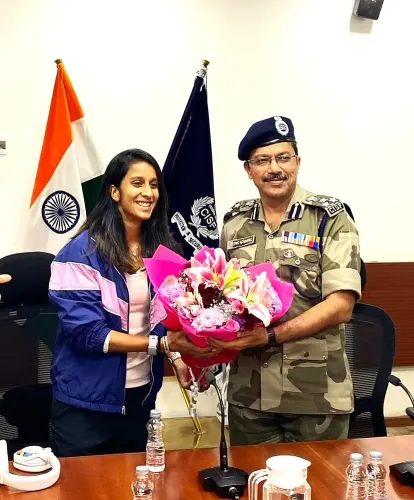Ponting Commends Australia for Leadership, Team Resilience, and Adaptability in BGT Triumph

New Delhi, Jan 8 (NationPress) Australia successfully reclaimed the Border-Gavaskar Trophy with a 3-1 series victory over India, marking the end of a ten-year wait for triumph in this historic rivalry. The achievement garnered high praise from former Australian cricketer and ICC Hall of Famer Ricky Ponting, who commended the team’s resilience, adaptability, and leadership.
The series commenced on a disheartening note for Australia, as they suffered a significant defeat in Perth. Jasprit Bumrah’s devastating bowling performance, alongside centuries from Yashasvi Jaiswal and Virat Kohli, propelled India to a commanding victory. Australia appeared fragmented, attracting criticism from fans and analysts alike.
Ponting reflected on the disappointing start, stating, “When I look back at the beginning of this series and just see how far off the mark the Aussies were in that first match, I think there was a lot of criticism directed at the team. It almost seemed a bit un-Australian,” Ponting shared with ICC Review.
However, the prolonged interval between the first and second Tests turned out to be advantageous. According to Ponting, it allowed the Australians to reset, refine their game plans, and eliminate external distractions. “When you lose a Test match like that against another very strong opponent, you do need to engage in some soul-searching and extensive discussions. The break afforded the Australians an opportunity to set aside media speculation and white noise, and focus on the Adelaide match,” he emphasized.
The transformation was evident in Adelaide as Australia bounced back with a decisive victory, establishing the momentum for the remainder of the series. Travis Head emerged as a key player, delivering crucial innings when the team needed it most. Ponting underscored the strategic management of crucial players like Head and Pat Cummins, whose peak performances were pivotal. “As we observed, it turned out to be excellent management because those players were at their best during the latter stages of the five Test matches,” Ponting commented.
A foundation of Australia’s success was their exceptional bowling unit, comprising Mitchell Starc, Josh Hazlewood, Nathan Lyon, and captain Pat Cummins. Together, they constitute a historically formidable quartet, with each bowler accumulating over 300 Test wickets. “The bowling group itself has accomplished remarkable feats,” Ponting stated. “This is the first instance in Test match history that four bowlers with such records have played in the same lineup.”
Ponting also praised Cummins’ dual capacity as captain and match-winner. The Australian skipper was crucial, concluding the series with 25 wickets (the second-highest) and contributing 159 vital runs. “Pat has evolved as a player and as a leader,” Ponting noted. “Whenever challenges arise as captain, he doesn’t look to others. He steps right back into the attack and more often than not, he delivers.”
Australia’s victories in Melbourne and Sydney highlighted their adaptability. Historically viewed as advantageous for India, these venues saw Australia outclassing their opponents in every aspect. Ponting highlighted the importance of winning in such conditions, asserting, “The conditions that are usually favorable for India, Australia found a way to outperform them.”
Despite their achievements, Ponting recognized the inevitable challenges posed by an aging squad. With no players in their 20s apart from 19-year-old phenomenon Sam Konstas, Australia must prepare for a generational transition. “There’s not a single player in their 20s on that team. That’s going to be the next challenge for this Australian group, not only for the team but for Australian cricket as a whole,” Ponting cautioned.
He emphasized the importance of upcoming tours to Sri Lanka and the West Indies as opportunities to integrate young talent into the squad. However, he warned that debuting in challenging conditions like Sri Lanka could be a daunting task for inexperienced players.
“If they are considering introducing young players, it probably needs to commence in Sri Lanka and the West Indies,” Ponting remarked. “But Sri Lanka won’t be an easy place for anyone to start.”
With the Border-Gavaskar Trophy, the ICC World Test Championship, and the ICC 50-over World Cup in their possession, Ponting believes this Australian team has established itself as a cricketing powerhouse. “They now possess every bilateral trophy available worldwide,” he concluded. “They’ve accomplished remarkable feats together.”









